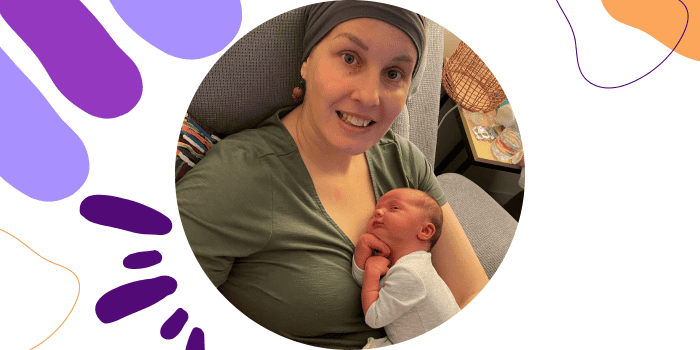After a decade of teaching indigenous kids in central Australia, and Chris surviving a cardiac arrest, we had plans to take long service leave and travel Australia in our caravan.
We were beyond excited when we received the news our longed-for IVF miracle baby was on the way too.
We knew our world was about to shift but not in this way. I was 35 and 6 weeks pregnant, I was taking a shower, when I found a lump about the size of a pea. I went to GP and was sent for a scan and biopsy.
At 12 weeks pregnant, I was told I had triple negative breast cancer, grade 3.
I just went into shock, and I remember driving to my Mum and Dad’s afterwards… and collapsing on their bed, thinking, oh my God my life is over.
This is it, sort of thing. Chris and I had waited 7 long years for our IVF baby, and I was concerned what it meant for our baby and my future. I was a mess for probably 3 days. I just sat at my Mum and Dad’s, and I just cried, and I cried, and I cried. I didn’t leave their house.
When you receive a diagnosis, it can really shake you up. I remember feeling completely overwhelmed. That’s when my Pop offered some words of wisdom: “Rebecca, you’re going to get through this; you just have to stay positive.” I nodded and told him, “Yeah, okay, that’s what I’ll do.”
I started chemotherapy at 14 weeks pregnant, when it would be safest for the baby. I was just worried that something was going to happen to my baby the whole time. And I remember they said to me, ‘she’s healthier than you are’. They were checking on her all the time but there were complications for me. I was admitted to hospital and had 3 blood transfusions. Our baby was taking what she needed from me to thrive.
Chemotherapy was stopped at 35 weeks and our beautiful baby girl, Ivy, was born at 37 weeks. When she came out, she wasn’t breathing, so I didn’t get to meet her for 9 1/2 hours. She was in intensive care when I got to meet her, but Ivy is a little fighter. She was the one I had to be strong and positive for because we’d waited for her for so long.
About 2 weeks after the birth, I went for IV Chemotherapy again for 3 months, followed by surgery, then radiation and oral chemotherapy. Even with my wonderful, supportive family, it was a lot for a new mum. It was my nurse, Louise, at Fiona Stanley Hospital who referred me to Breast Cancer Care WA and that’s where I met Leah, my breast cancer nurse.
When people explained things to me in the medical terms, it just gave me anxiety. When Leah would explain things to me, it didn’t sound too bad, because it didn’t sound so big. I didn’t understand a lot of the things they were saying, but then Leah would sit down and explain it to me, and it made those feelings of anxiety go away.
When you’ve had a mastectomy and chemotherapy, you can’t lift things and you’re immunocompromised so you can’t be playing with chemicals. She organised a cleaner for me, which after my mastectomy or when I wasn’t feeling well from chemo, really helped… the house looked immaculate; it was one less thing to worry about. I would be absolutely lost without Leah. I’m a teacher, I don’t understand medical jargon. Leah was and is an absolute lifesaver. Just to know that help is there when you need it… food vouchers or gardening or transport or support groups, and not just for me, but for my family as well is phenomenal.
I’m still recovering from all this and there’s still more oral chemo and surgery in my future. My right breast will be removed in 2024. Now, it’s about building up my immune system and spending time with my family.
Cancer reoccurrence will always be in the back of my mind. Will I be, ok? And now, as a mother, I think of my daughter. Will she be, ok?
To know Leah is only a phone call away to help with my recovery is incredible.
The cancer world is a scary place and I urge anyone facing cancer or supporting someone through cancer to reach out and talk to someone if they need. Tell people how you’re feeling. Without the support of Breast Cancer Care WA and those that give, I would probably have struggled with things like cleaning or trying to understand. They helped relieve any anxiety I had about my current situation, and I didn’t have to worry about food or help or support, I could get it.
That’s one less thing for people to worry about when they’ve got cancer.

